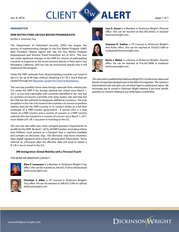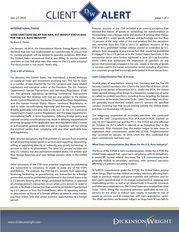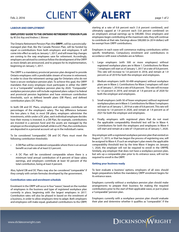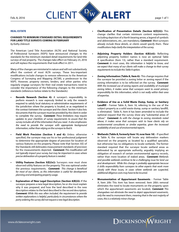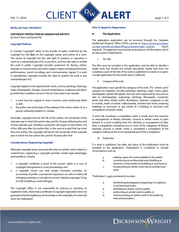Canada Relaxes Iran Sanctions - Making it Easier to do Business with Iran - February 11, 2016
Dickinson Wright
Description
Feb. 11, 2016
CLIENT
to be broadly prohibited from engaging in transactions or dealings
involving Iran or the Government of Iran.
The measures taken to grant limited authorization for U.S. owned or
controlled foreign entities to engage in some transactions with Iran
are outlined in General License H, issued by the Treasury Department’s
Office of Foreign Assets Control (OFAC). General License H permits a
U.S.
person to alter operating policies and procedures to accommodate permitted transactions and to make its automated, globally integrated communication and support systems available to foreign entities involved in permitted transactions, provided that the systems operate passively and without human intervention and are not used for any transfer of funds involving the U.S. financial system. Notably, the direct or indirect export, reexport, sale or supply of any goods, technology or services from the United States or by any U.S.
person, wherever located, in connection with these transactions remains prohibited, effectively barring the supply of U.S. origin goods, technology or services directly to Iran or to third countries for incorporation into other items destined for Iran. General License H also expressly confirms that the prohibitions on facilitation by U.S.
persons remain in effect except for the narrow exceptions under the license. This means that U.S. persons may not be involved in the ongoing Iran-related operations or decision making of a U.S.
owned or controlled foreign entity. The license also enumerates several categories of transactions that are not authorized for non-U.S. persons, such as funds transfers involving the U.S. financial system, transactions involving designated entities or persons or any Iranian military, paramilitary, intelligence or law enforcement entity, any sanctionable activity related to terrorism, Syria, Yemen, human rights abuse or weapons of mass destruction or their means of delivery, any activity involving unapproved nuclear procurement channels. Nor have all other secondary sanctions been lifted.
For example, nonU.S. persons remain subject to sanctions for transactions or support involving persons or entities on OFAC’s List of Specially Designated Nationals and Blocked Persons. General License H also confirms that non-U.S.
persons remain subject to the prohibition on the direct or indirect reexport to Iran from a third country of goods, technology or services of U.S. origin that are subject to export control license requirements if the non-U.S. person knows or has reason to know that the reexportation is intended specifically for Iran or the Government of Iran and the goods or technology constitute ten percent or more of the end product’s total value.
For this reason, these items continue to require a Canadian export permit, even though items containing U.S. content as provided in Item 5400 of Canada’s Export Control List are not on the Denial List. The International Trade Group at Dickinson Wright is monitoring the situation on both sides of the Canada-U.S. border and will provide regular updates as matters develop in this area. ALERT page 3 of 3 This client alert is published by Dickinson Wright PLLC to inform our clients and friends of important developments in the field of cross border law. The content is informational only and does not constitute legal or professional advice.
We encourage you to consult a Dickinson Wright attorney if you have specific questions or concerns relating to any of the topics covered in here. FOR MORE INFORMATION CONTACT: Brenda C. Swick is a Member in Dickinson Wright’s Toronto office. She can be reached at 416.594.4052 or bswick@dickinsonwright.com. Daniel D.
Ujczo is Of Counsel in Dickinson Wright’s Columbus office. He can be reached at 614.744.2579 or dujczo@dickinsonwright.com. Bruce C. Thelen is a Member in Dickinson Wright’s Detroit office.
He can be reached at 313.223.3624 or bthelen@ dickinsonwright.com. .
person to alter operating policies and procedures to accommodate permitted transactions and to make its automated, globally integrated communication and support systems available to foreign entities involved in permitted transactions, provided that the systems operate passively and without human intervention and are not used for any transfer of funds involving the U.S. financial system. Notably, the direct or indirect export, reexport, sale or supply of any goods, technology or services from the United States or by any U.S.
person, wherever located, in connection with these transactions remains prohibited, effectively barring the supply of U.S. origin goods, technology or services directly to Iran or to third countries for incorporation into other items destined for Iran. General License H also expressly confirms that the prohibitions on facilitation by U.S.
persons remain in effect except for the narrow exceptions under the license. This means that U.S. persons may not be involved in the ongoing Iran-related operations or decision making of a U.S.
owned or controlled foreign entity. The license also enumerates several categories of transactions that are not authorized for non-U.S. persons, such as funds transfers involving the U.S. financial system, transactions involving designated entities or persons or any Iranian military, paramilitary, intelligence or law enforcement entity, any sanctionable activity related to terrorism, Syria, Yemen, human rights abuse or weapons of mass destruction or their means of delivery, any activity involving unapproved nuclear procurement channels. Nor have all other secondary sanctions been lifted.
For example, nonU.S. persons remain subject to sanctions for transactions or support involving persons or entities on OFAC’s List of Specially Designated Nationals and Blocked Persons. General License H also confirms that non-U.S.
persons remain subject to the prohibition on the direct or indirect reexport to Iran from a third country of goods, technology or services of U.S. origin that are subject to export control license requirements if the non-U.S. person knows or has reason to know that the reexportation is intended specifically for Iran or the Government of Iran and the goods or technology constitute ten percent or more of the end product’s total value.
For this reason, these items continue to require a Canadian export permit, even though items containing U.S. content as provided in Item 5400 of Canada’s Export Control List are not on the Denial List. The International Trade Group at Dickinson Wright is monitoring the situation on both sides of the Canada-U.S. border and will provide regular updates as matters develop in this area. ALERT page 3 of 3 This client alert is published by Dickinson Wright PLLC to inform our clients and friends of important developments in the field of cross border law. The content is informational only and does not constitute legal or professional advice.
We encourage you to consult a Dickinson Wright attorney if you have specific questions or concerns relating to any of the topics covered in here. FOR MORE INFORMATION CONTACT: Brenda C. Swick is a Member in Dickinson Wright’s Toronto office. She can be reached at 416.594.4052 or bswick@dickinsonwright.com. Daniel D.
Ujczo is Of Counsel in Dickinson Wright’s Columbus office. He can be reached at 614.744.2579 or dujczo@dickinsonwright.com. Bruce C. Thelen is a Member in Dickinson Wright’s Detroit office.
He can be reached at 313.223.3624 or bthelen@ dickinsonwright.com. .

